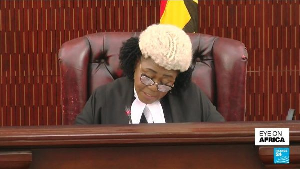Apparently not! Countrymen and women, loyalists and opponents, what has this nation come to? There used to be a time when armed thieves went into peoples homes, fired a few warning shots to scare hell out of them and proceeded to rob them of their valuable acquisitions – jewellery, cars, electronic appliances etc. Occasionally, the thieves will kill, especially those who resisted. They even raped women, sometimes. So as Jesus said, they “come to kill, steal and destroy.” So whenever there was a report about armed men raiding anyone’s home (whatever they stole and destroyed or whoever the killed), we knew that at least they had motives other than killing. The primary motive was usually to steal. Killing was secondary.
These days in Sikaman, however, armed men have been on the rampage killing people for no apparent reason – seemingly without any motive besides the taking of life. Take what happened very recently in Tema for example. A retiree wakes up, expecting a usual day in which he would most probably sit at home and play around with his grand children, visit his friends and essentially do all the things retirees do. Then there is a knock on his door. He has a ‘visitor’, he told. He goes to the door to receive the unexpected visitor and suddenly, ‘bang’ – gunshots and the man is lying dead in a pool of his own blood. Whoever fired the shot is nowhere to be found. They came just to kill – not to steal or destroy.
That’s strange, isn’t it? And it’s also scary.
The menace started some months back when an official of Sikaman Telecom was murdered in cold blood in his house. The killers stole nothing. So at the time we thought that perhaps they were in a hurry and/or something might have happened that prevented them from stealing. Then there was the unprovoked shooting death of a journalist who was relaxing in a bar in Kumasi. Then there was the murder of the deputy managing director of the Sikaman Commercial Bank who was also gunned down at the entrance to his house. Those who killed him stole nothing. Destroyed nothing. We were all shocked but none of us read deeper into it and we failed to make the connection with the murders that preceded that of the banker. None of us… except Tata Mills. He’s always been a smart guy, hasn’t he?
Tata Mills is about the only Sikaman citizen who realised that our country had been ushered into a new era – the era of contract killings. He issued a statement and spoke extensively on radio to draw attention to the menace he had identified. No doubt, there were a few political flavourings in comments. He made remarks which implied thus: ‘We left power and look at what’s happening – people are being killed for no reason. If only we were in power, this wouldn’t be happening and people will feel more secure’.
That why most of us didn’t take him serious and we dismissed his concerns as the ranting of a paranoid, power-hungry politician… until the recent killing of the retiree in Tema.
Now, I have decided to sit up and worry about the recent murders. Much as I hate to use Tata Mills’ term, I am compelled to agree with him that we are dealing with contract killers, who have no other motive than to kill. And I’m as worried about this new face of crime as you are. I know a lot of you are wondering: “Who next? What next?”
I have been speaking to a few people and some of things I’ve heard point to the fact that there are indeed young men in Sikaman who will do anything they are asked to do for just a few cedis. These are able-bodied, desperately unemployed hustlers who have no hope in the future and have therefore resorted to crime to stay alive. They are the same people who worked as land guards in time past until the police decided to wage a war against them. They went into hibernation but now we are seeing their resurgence.
These crime-for-hire guys, I am told will do anything for dough. They started out beating people senseless. A friend of a friend of mine told me that she was seriously wronged by a colleague and when she poured out his lamentations to a family member, he offered to procure the services of a gang to beat up the offender to “teach him a lesson”. The suggestion scared her so much that she decided to quickly forget about the offence and forgive the guy who affronted her.
I have also heard from a number of junior police officers that there are certain areas in Accra and Kumasi where you can publicly advertise your need for people to commit a crime on your behalf and you’d get more than a dozen bids for the job. The police know about this. The problem, as always, is that, they are failing to act, choosing rather to wait for the situation to get out of hand before they step in.
Police are also aware that most of the guns that are being used for these killings are weapons in the hands of the wrong people. So much noise has been made in the past about illegal arms in our society and I remember there was a drive a few years ago to encourage people to give up their illicit weapons or at least have them registered. Nothing came out of that, I believe, and we are still faced with the scary problem of people wielding deadly weapons. Recently, I’ve received a few reports that police officers are even selling weapons to prominent, private individuals and bandits. Take the recent testimony of the son of the business tycoon, Banda, for example. Junior Banda told a court a few days ago that he had bought ammunition from officers at the Cantonments Police Station.
What’s my point? We are faced with a serious threat. We shouldn’t wait for it to get out of hand before we start panicking. When panic sets in, we will only end up adopting bandage solutions. The police should know how to deal with the problem and they should be up and doing quick. If they feel handicapped in anyway, they should contact the other security agencies for help. What I want to see in the short term is a serious effort on the part of the police to retrieve all the illegal weapons in the system. That will be start.
Secondly, the IGP needs to back his talk about community policing with serious deeds. Effective community policing, which involves public engagement on an informal level, will lead them to the dens of the dangerous hoodlums who will kill (and commit any crime) for a few cedis.
I know I have made quiet a number of enemies and as I prepare to leave office (which would mean that security around me wouldn’t be as tight as it is now) I am scared of the prospect that if care is not taken I might be a victim of a contract killer. Many other citizens are scared too and the sooner the police stepped in to assure us all that we are safe and secure, the better. Sikaman cannot afford to be turned into a nation of 20 million panic-stricken people.
Scared,
J. A. Fukuor
fukuor@gmail.com


















